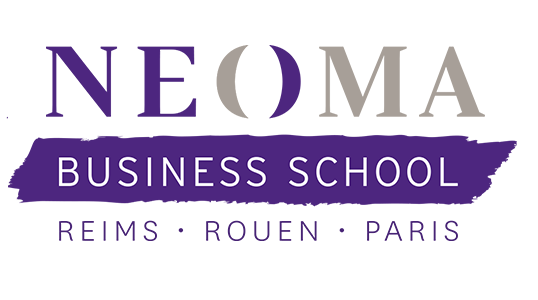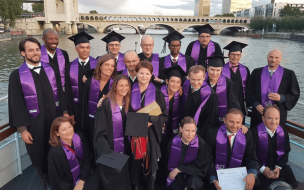Particularly today, when cultural, environmental, and technological factors make adaptability a highly-valued business skill, self-improvement is the name of the game for young professionals—but senior leadership could do with taking this advice, too.

Emmy Druesne (pictured right) is the head of the personal development program on the Global EMBA at NEOMA Business School in France. She says that fostering personal development is key to knowing how to be a good leader, so much so that it makes up 20% of the curriculum on the NEOMA EMBA.
But what exactly does self-improvement look like when you’ve already reached a senior executive role?
1. Have a long-term vision
The first part of fostering self-development is knowing where you want to end up, says Emmy—“With our students, the [goal] is to help them create a vision that goes beyond the Executive MBA. What is the vision of the life I want to create in five years, in 10 years?”
There are three different elements to this, she explains: firstly, what vision executives have of themselves.

This might mean different things for different people, but often it means cultivating new skills, for instance in the tech space: the EMBA at NEOMA gives students the chance to learn about managing digital disruption, with classes that verse execs in how AI, blockchain, and big data are affecting businesses.
The next element is how they want to change their relationships with others, both in their personal and professional lives.
“Students ask themselves questions like, ‘Do I want to be a better manager?’ ‘Do I want to be more risk taking?’ ‘Do I want to be more caring with my family and spend less time at work?’” Emmy says.
This introspection is key to the final element of visioning at NEOMA: how you can up the value that you create for your business.
“Once we have this vision,” Emmy says, “we go back to the beginning and work out how to put it into action.
“We’re always creating a tension between a broader vision, the high-level plan, and the day-to-day—what can I do right now to change my career?”
2. Accept feedback
Envisioning the long-term future is an essential element of personal growth for executives, then.
However, in order to bring that future about, Emmy says that EMBAs must first get well-acquainted with who they are in the present.
The way that they do this at NEOMA is to offer the EMBA program as a space for executives to gain feedback from their professors and their peers; through group seminars on commitment-driven leadership, individual coaching from NEOMA faculty, even a five-day international learning experience in India centered on mindset shifting.
This is key to understanding what it is that’s holding them back from further advancement.
“We ask them to examine what energy they bring to the room, to name it and comment on it—they have to ask themselves how they can use that energy in service of their team,” Emmy says.
Maybe it’s a lack of charisma, that they don’t seem ‘directorial’, or simply that their team doesn’t trust them—but whatever it is that's holding them back, Emmy counsels executives to receive critique without getting defensive.
“It’s really hard to see for yourself what your blank spots are,” she advises. “Feedback is a tool for us to look into ourselves—if we have a strong reaction to something, that means there may be some truth in it.”
3. Make concrete change
Of course, the real measure of personal development at the executive level is what you do with your vision and this feedback once you have them.
When her students learn to bring about their big-picture thinking through everyday action, Emmy says that she sees huge changes in their careers and how they view themselves.
“Often, people [enrol on the EMBA because] they are not where they thought they would be,” she says. But by the end of the EMBA, grads understand themselves much better.
“Some people quit their jobs or decide that the director role [they were hoping for] doesn’t work for them, that it’s not what they wanted, it’s what people expected—maybe they actually want something more entrepreneurial.”
Other students might have the opposite realization: that they want to step up onto the next rung of the corporate ladder as a director.
Whatever their ambitions at the end of the EMBA, Emmy says that what unites the students is their ability to realize these changes.
“The biggest changes I see are in students asking for what they want instead of waiting,” she reflects. “They’re responsible for what they want to create, whether that’s asking for a promotion, building a relationship, a business line, or a company.
“For them to be able to step back and say, I don’t know how I’m going to do it, but I am going to do it—that’s true leadership, not just management.”








